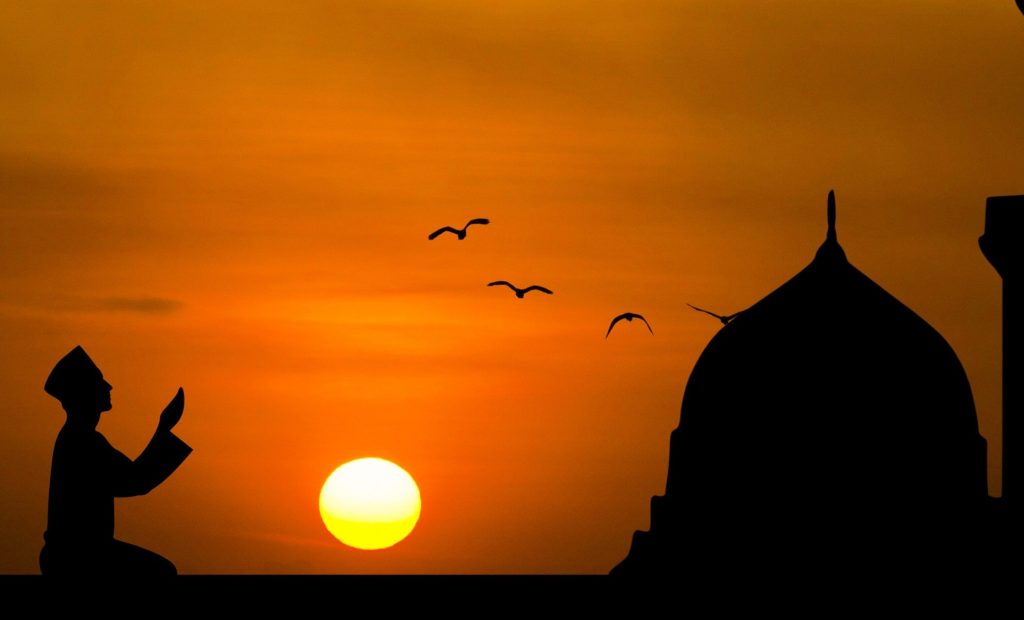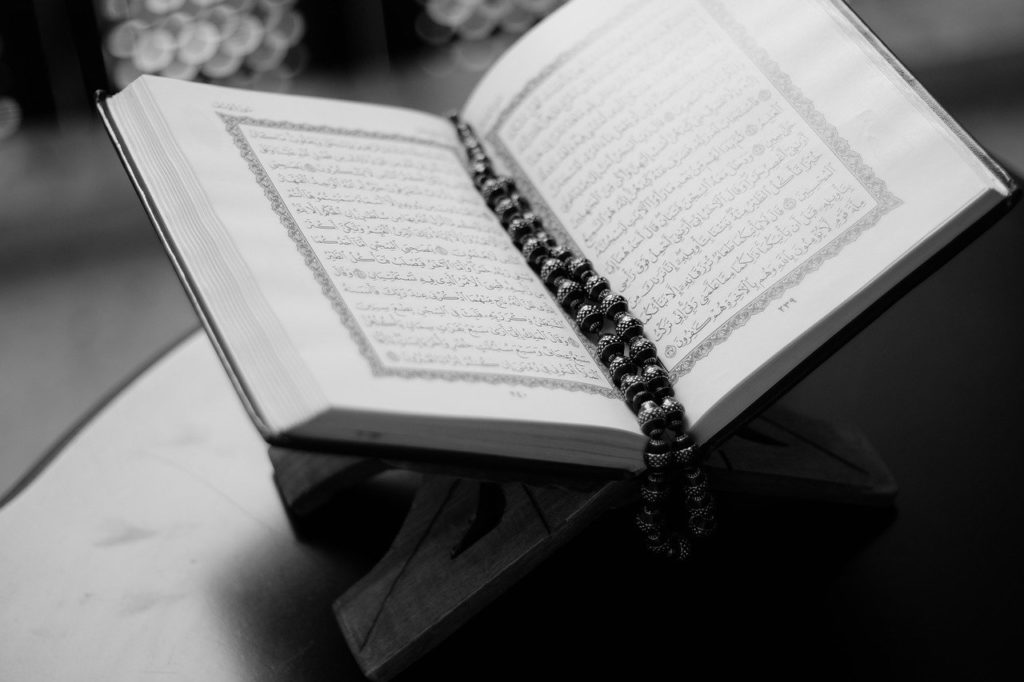‘And when My servants ask you, (O Muhammad), concerning Me – indeed I am near. I respond to the invocation of the supplicant when he calls upon Me. So let them respond to Me (by obedience) and believe in Me that they may be (rightly) guided.’
Quran [2:186]
What is Dua?
Allah has ordered us to supplicate to Him and He has promised to answer. In many verses of the Quran, Allah instructs the believers to call on Him. He praised His Messengers and Prophets who did so saying:
‘…..Indeed, they used to hasten to good deeds and supplicate Us in hope and fear, and they were to Us humbly submissive.’
Quran [21:90]

The act of Dua, or calling on Allah, is one of the most superior forms of worship, as it is a method of humbling oneself in front of his Creator. It is a sign of servitude, through which we submit our affairs wholly to Allah, which He loves and responds to. We ask Him because only He can give. He has power and knowledge over everything while we know very little.
The Prophet (SAW) said: ‘There is nothing more honourable to Allah than Dua.’ He also said: ‘Allah is angry with those who do not make dua to Him.’ (Tirmidhi)
Allah says: ‘Call upon your Lord in humility and privately; indeed, He does not like transgressors…. And invoke Him in fear and aspiration. Indeed, the mercy of Allah is near to the doers of good.
Quran [7:55-56]
Best Method of making Dua
- Humble yourself in front of Allah. Hoping for His reward and fearing His punishment. This is the essence of dua.
- Have firm conviction that the supplication will be answered. The Prophet (SAW) said to make dua to Allah whilst you are certain of a response because He does not accept a dua from a heedless, distracted heart.
- Be persistent. Whoever keeps knocking on the door will eventually have it opened for him. The Prophet (SAW) said: ‘Verily your Lord is Generous and Shy. If His servants raises his hand to Him, He becomes shy to return them empty. (Tirmidhi)
- Do not be impatient. Rasulullah (SAW) said: ‘The dua of every one of you is accepted as long as he does not grow impatient and says: ‘I made dua but it was not accepted.’ (Muslim)
- Avoid sinning and consuming haram. How can a person ignore the limits set by Allah and then expect Him to fulfil his requests? The Prophet (SAW) talked about a man supplicating Allah saying: ‘O Lord, O Lord’ but his food is unlawful, his drink is unlawful, his clothing is unlawful and he was nourished with unlawful, so how will his dua be accepted?’ (Muslim)
- Supplicate with Duas from the Quran and Sunnah. As the duas from these sources are superior and unmatched in completeness. However, it is fine to make duas choosing your own words.
- Make plenty of duas in times of ease. The Prophet (SAW) said: ‘Remember Allah during times of ease and He will remember you during times of hardship.’ (Ahmad)
- Ask for everything. You should be ambitious and not limit yourself to asking for small matters only in difficult times. Nothing is too big or too small to be asked for and to be given. The Prophet (SAW) said: ‘When one of you asks for something from Allah, then let him be plentiful (in what he asks for), for indeed he is asking his Lord.’ (ibn Hibban)
- Prepare yourself. Perform wudhu (ritual ablution), face the Qiblah (direction facing Kaaba in Mecca) and raise your hands. These are not essential for the making of dua but shows how much you value this act and who you are asking from.
- Do not become despondent. Even after prolonged duas and patience, you must not think your dua has been rejected but should remain optimistic because the Prophet (SAW) stated: ‘No Muslim makes dua which does not entail a sin or the severing of the ties of kinship without Allah giving him one of three: He fulfils his dua immediately; or He stores it for him in the hereafter; or He averts from him a similar evil.’ The companions then said: ‘If that is so, we will make dua even more.’ The Prophet (SAW) replied: ‘Allah will respond even more.’ (Ahmad)
Occasions when duas are accepted
- At the end of fardh prayers 5 times a day.
- When a parent makes dua for a child.
- When it rains.
- When travelling.
- During the last portion of the Day of Jumah (Friday) i.e. the hour before sunset.
- During the last third part of the night.
All the above have been taken from Hadith from the books of Bukhari, Tirmidhi or Abu Dawud

Steps to follow when making Dua
Start with praising Allah – When one reflects on the duas in the Quran made by the Prophets, one marvels at the humility and awe which shines through their words. Each dua is an awareness of and deep intimacy with their Lord. Rather than rushing to make their requests, they praised Allah and glorified Him first. The Prophet (SAW) said: ‘There is none who likes to be praised more than Allah does.’ (Bukhari)
The angels have also shown us how to make dua by praising Allah. They initiated their dua by saying ‘Our Lord…You have encompassed all things in mercy and knowledge,’ before asking for forgiveness for those who have repented and followed Your way.’
Though many of us make dua regularly, we fail to praise Allah adequately. Because we have failed to recognise who Allah is, the praise due does not spring from our hearts as easily as it should. He deserves to be known.
How should Allah be praised?
- The best way to praise Allah is as He has praised Himself. This can be learnt by reciting the Quran, reflecting upon it and building a strong bond with it, since it is full of verses of Allah praising Himself.
- Praise Him as the Prophet (SAW) praised Him. None surpassed him in knowing and appreciating Him as He ought to be.
- Praise Him using the words used by the Companions (RA) and the pious predecessors.
- Praise Him with your own words emanating from the heart, as long as it does not contradict core beliefs of Islam.
Send Durood and Salawat upon the Prophet (SAW)
Sending abundant durood and salawat (asking Allah to invoke His blessings on the Prophet and to honour him) on the Prophet is a manifestation of our love, reverence and obedience to him. He was sent as a mercy to mankind, and always remembered and worried about us.
On one occasion he lifted his hands and wept saying: ‘O Allah, my ummah (people), my ummah!’ Thinking about us all the time. In every Salah (prayer) he would ask Allah to forgive us.
Every Messenger was given one exclusive dua which would be accepted, unlike all the other Messengers who had their duas accepted in this world, the Prophet (SAW) reserved his exclusive dua for the Day of Judgement where he will intercede on our behalf. (Bukhari)
Ask Allah by His beautiful Names
‘And to Allah belong the best names, so invoke Him by them….’
Quran [7:180]
Calling on Allah means praising and worshipping Him, and then making dua to Him with them.
The Prophet (SAW) said: ‘Allah has 99 Names, whoever preserves them will enter Paradise’ (Muslim)
Relevant Names can be called upon for specific requests. As an example, when asking for forgiveness, say’ Ya Tawwab’ (The Acceptor of Repentance)
Seek forgiveness
Before asking Allah for anything, you should ask Him to forgive you, because He loves to forgive. When seeking forgiveness, try to feel remorse in your heart, cry over your sins and beg Allah to forgive you.
It is also virtuous to ask forgiveness for all the believers.
The secret of dua
The secret to making a dua is to display one’s dire need of Allah, with utmost humility and desperation. Breaking down in desperation and begging Allah is how we should make dua on a daily basis as if we could not survive without it and our very lives depended on it.
We are weak and in need of Allah for everything. We cannot do without Him for even a split second. So let us beg Allah whole-heartedly and sincerely and we will witness the gifts being showered in our lives.



